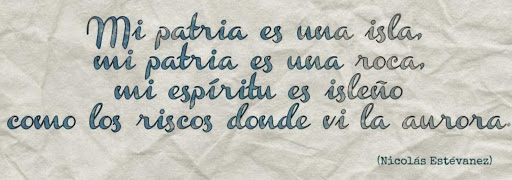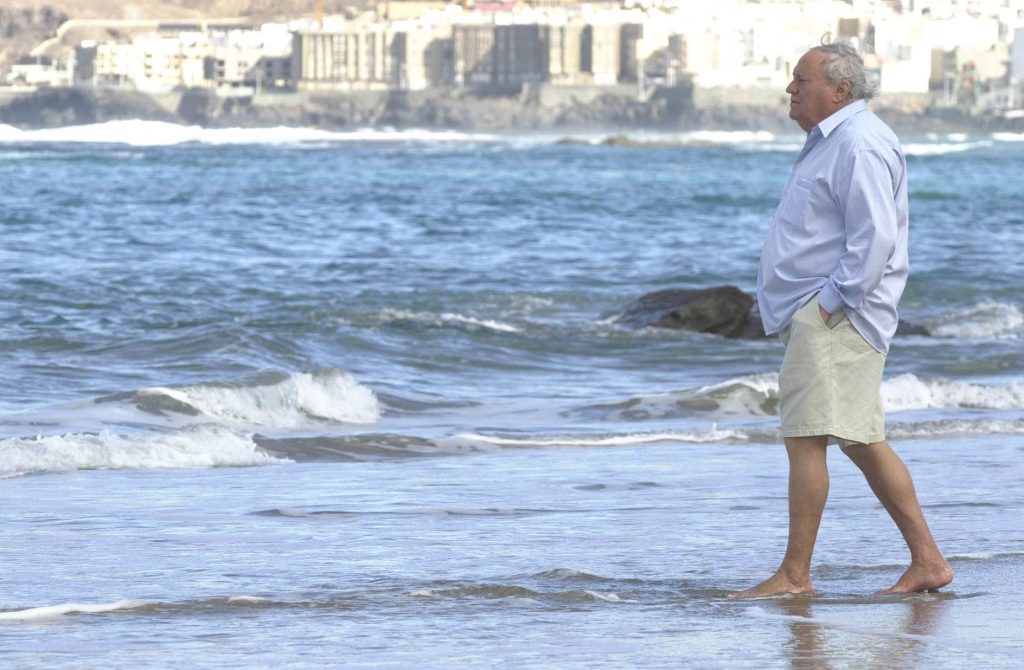Publicado el 20.03.2021. Agustín Santana.

Agustín Millares Sall (1917-1989)
<<La palabra o la vida>>: 1989.
Escuchad, de hombre a hombre, en las mares violentas que navegar nos toca
rebasado el eclipse del terror en la boca, los instantes del mundo llamados por su nombre.
Escuchad la palabra que hace frente a la muerte por amor a la vida.
Escuchad la palabra que no ha sido vencida a pesar de que vive de espaldas a la suerte.
Mientras cae una lluvia que la tierra sedienta hasta los huesos cala,
el vientre de la tierra se extiende como un ala,
y el rayo que ha hecho blanco desploma la tormenta.
Se ha llegado hasta el límite del sufrimiento humano, y la evasión no existe.
La vida que aún hay dentro del hombre se resiste a no saber de un mundo que alcanza con la mano.
Escuchad la palabra que repite sin tregua la verdad de las cosas;
la palabra que engendra tempestades y rosas para que la clausura de los ojos se abra.
Hasta el árbol más firme tiembla de pies a cabeza y las puertas dan golpes cada vez más violentos. Como el perro y el gato, las aguas y los vientos
se erizan al contacto de la naturaleza.
La libertad dormida por fin ha despertado. Levanta el tiempo el ancla para seguir su ruta,
y la mirada, libre de toda nube, escruta el más amplio horizonte que el sol ha iluminado
Escuchad la palabra que del alma despega para que sean claros los caminos oscuros. Escuchad la palabra que atraviesa los muros
porque es algo de todos, y al corazón nos llega.
A su paso la bruma se vuelve fugitiva y se mueven las tierras sin que un dios las sacuda;
el más hondo secreto del ayer se desnuda y la voz de los vientos se levanta agresiva
Los pueblos que han llegado con su dolor muy lejos en las entrañas cantan un júbilo inminente.
Una nueva alegría pone clara la frente y limpia las pupilas hasta hacerlas espejos.
Escuchad la palabra que la forma dibuja de la vida más bella.
Escuchad la palabra que a viajar nos empuja por encima del pájaro, más allá de la estrella.

Manuel Padorno (1933-2002)
<<Camino de mi ventana>>. Hacia otra realidad (Tusquets Editores)
Yo me eché a caminar por un camino que llevaba a la fábrica de luz.
Un camino, además, que terminaba delante de mi casa, justamente al abrir la ventana que da al mar.
Yo me fui convirtiendo, sin pensarlo, en un obrero más, de los que abría Las más grandes compuertas invisibles, celestes transparencias, y engrasaba los émbolos más altos, las poleas que elaboraban la mañana atlántica.
Después de mucho tiempo, tantos años de aprender el oficio, convertido en un obrero ya especializado. Me fue confiado dar la luz del día.
Como un profesional, yo me dedico a cumplir la faena encomendada, apenas conocida por mi barrio. Yo me eché a caminar por un camino que termina delante mi ventana, donde pulso la grande maquinaria.
Manuel Padorno en su Playa de las Canteras

Carlos Pinto Grote (1924-2015)
<<Llamarme guanche>>
Llamarme guanche. Hijo de los volcanes y las lavas.
Llevar la frente alta. Tener el corazón hecho de libertades.
Llamarme guanche, nada más. Mi patria: un negro malpaís;
mi flor: una retama.
Beber agua de una fuente, descansar bajo un pino, tener la mar que me separa de todo aquello que no quiero y que me ata.
Llamarme guanche. Labrar puntas de lanza, darle vueltas al barro
y que el gánigo nazca.
Caminar sin caminos, subir a la montaña, mirar entre las nubes.
San Borondón lejana…
Tallar con la tabona en una añepa larga. En cada beñesmén recoger de la tierra yrichen, yayo, tano, beber ahof de hara.
Dar gracias a Achamán. Labrar una obsidiana
para mirar mi rostro de hombre libre
cuando nace Magec, cada mañana.
Llamarme guanche. Enterrar a mis muertos en paz. No saber nada.
Que el mundo se limite al norte en un volcán; alrededor de la playa.
Llamarme guanche. Hundir a los navíos y a las barcas
que abrieron en la mar caminos a la Isla, para robar su calma…
Estarme solo. Ésta es mi tierra humilde, ésta es mi humilde patria.
Tener el corazón hecho de libertades. Llevar la frente alta.
Llamarme guanche, hijo de los volcanes y de las lavas.

Carlos Pinto Grote en su casa de La Laguna
Manuel González Sosa (1921.2011)
«Exilio»:
Hiende tu cuerpo ahora el aire de un espejo.
Pisas tiempos secretos para tu espacio.
Palpas sus posos vivos: aras, fustes ilesos, vasos,
páginas irisadas, fuentes,
árboles alimentados por cenizas áureas.
Pero te sabes hondo,
caído desde el vértice donde las horas tienden
lavas del mediodía bajo los pies desnudos.

Manuel González Sosa
María Dolores De la Fe (1921-2012)
En el recuerdo de una mujer canaria única.
Es protagonista de una tesis realizada por David Pulido Suárez, licenciado en Filología Hispánica por la Universidad de Las Palmas de Gran Canaria (ULPGC), quien la sitúa a la altura de los mejores escritores canarios costumbristas: «Quizás actualmente sea la mejor», se ríe, «porque soy la única».
“Lola de la Fe rememora que desde muy niña ya escribía, aunque se lo inventaba todo, porque no le ocurría nada: «Mi infancia fue la más abatatada; era una niña gorda, pacífica y sana como una manzana. Estaba sentadita en el rincón del patio, en mi casa de la Alameda de Colón, imaginando cosas y leyendo cuentos, feliz. Desde chica era media simplona, pero no molestaba a nadie».
Algunos Libros:” “Isla Espiral”, “Las Palmas casi ayer”,” Tiempo en Sepia”, “ “El Mirador”, “Las Palmas casi mañana”,

